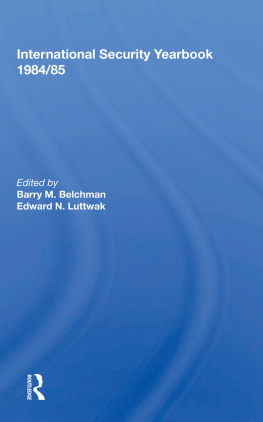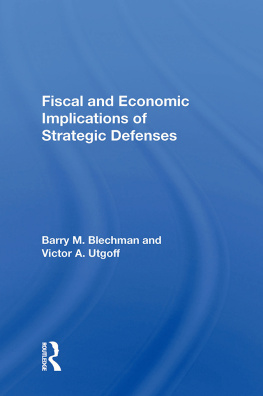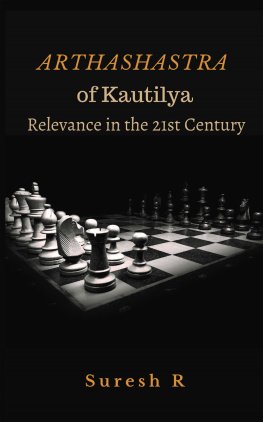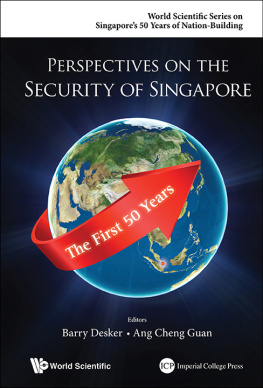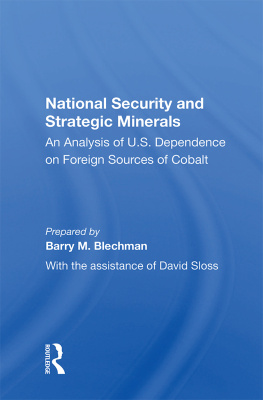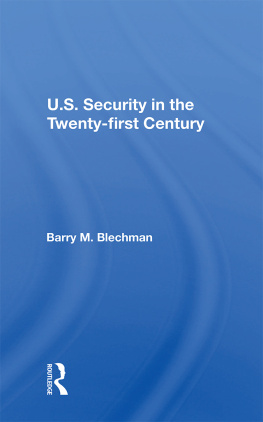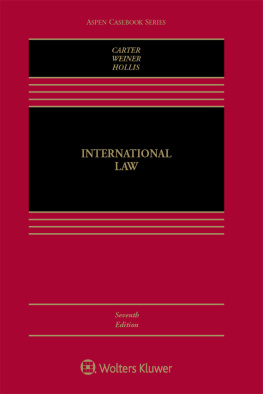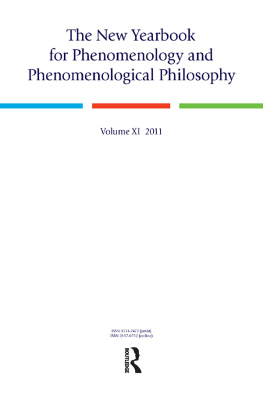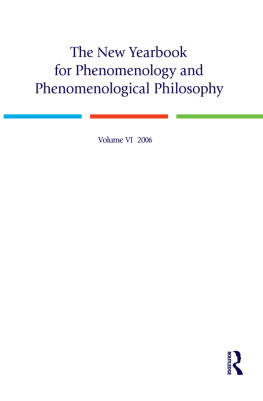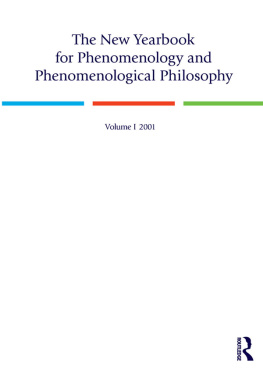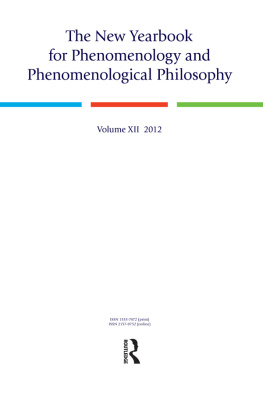First published 1985 by Westview Press
Published 2018 by Routledge
52 Vanderbilt Avenue, New York, NY 10017
2 Park Square, Milton Park, Abingdon, Oxon OX14 4RN
Routledge is an imprint of the Taylor & Francis Group, an informa business
Copyright 1985 by The Center for Strategic and International Studies. The views and conclusions expressed in this volume are solely those of the authors and do not purport to represent the policies of any government agencies of the United States or necessarily of the Georgetown University Center for Strategic and International Studies.
All rights reserved. No part of this book may be reprinted or reproduced or utilised in any form or by any electronic, mechanical, or other means, now known or hereafter invented, including photocopying and recording, or in any information storage or retrieval system, without permission in writing from the publishers.
Notice:
Product or corporate names may be trademarks or registered trademarks, and are used only for identification and explanation without intent to infringe.
ISBN 13: 978-0-367-00614-3 (hbk)
The year 1984 was in many ways a puzzling onea year of little solid accomplishment but much expectation, a year that witnessed the rebirth of American confidence and prestige but found few solutions to the problems that had undermined the nation's interests and weakened its influence, a year that reaffirmed the overriding importance of political leadership in determining the course of world affairs.
It was a year in which the nation's foreign policy returned in some aspects to familiar lines. Comity was restored to relations between Washington and its NATO allies, as well as with Japan. The difficulties that marked relations between the United States and China during the early years of the Reagan administration were set aside, if not resolved, as the two nations resumed progress toward normal and cooperative relations. The strident rhetoric that had characterized U.S.-Soviet relations for three years was muted sharply as both nations maneuvered for position prior to the restoration of serious arms negotiations. In the Middle East, the United States disengaged to a considerable extent from both the Lebanese situation and efforts to induce negotiations for an Arab-Israeli peace. In Africa, the United States remained deeply involved in efforts to resolve the Namibian conflict, although it made little progress. In Central America, the situation seemed to calm somewhat as the new government of Jose Napoleon Duarte in El Salvador curbed the most virulent excesses of the previous regime and the Salvadoran military appeared to make progress in its efforts to stabilize the nation; although both the Contadora group and direct negotiations between the government and rebels failed to end the civil wars either in El Salvador or Nicaragua, there was a clear change of tone in the discourse as contrasted to the situation of one year ago.
Militarily, the defense buildup initiated by the Reagan administration three years earlier began to show results, particularly in U.S. naval power and strategic forces. Both the nation's financial situation and the evident willingness of the Soviet Union to continue its competition with the United States made clear, however, that no margin of superiority would be attained in the near, or even distant, future. Economically, the strength of the nation's recovery during the first and second quarters of the year had a marked international effect, dramatically highlighting the advantages of the U.S. systemparticularly when contrasted to the Soviet Union's dismal economic prospectsand contributing markedly to the nation's relatively successful year in international affairs. By the year's end, however, the marked slowdown in economic indicators and the absence of any clear national strategy for dissolving the ominous specter of indefinite $200 billion deficitsand the beginnings of partisan and intraparty squabbles on alternative proposalsraised warnings that this economic source of international influence would probably not be sustained for long.
Politically, the nation's international position was strengthened by President Reagan's decisive election triumph and his ability to instill a sense of confidence and a positive outlook in many Americans. The image of a re-ascendant United Stateseconomically, technologically, and militarilydominated those problems that remained unresolved in world affairs, a perception that contributed markedly to restored relations with allies and more cooperative positions by many other nations.
The International Security Yearbook reviews these events in detail, presenting an empirical and objective assessment of the events of the year as they affect U.S. security. Through the Yearbook, we seek to contribute to the national debate on security policies by providing an authoritative description of the facts of the situation, a common basis that, if shared by contending viewpoints, can serve to narrow the range of debate and to facilitate its resolution in the common interest. Individual evaluations of feasible security policies necessarily depend greatly on personal judgments and preferences. Perceptions and values play a crucial role in international politics. But there is also an objective reality that provides the setting for these individual evaluations: the hard, often cold, facts of military power or impotence; the tangible manifestations of economic autarky or dependence; the consequences of personal ambitions and political associations. It is to this objective reality that the Yearbook is addressed.
The International Security Yearbook: 1984/85 the second in the serieswas prepared under the direction of Barry M. Blechman and Edward N. Luttwak; both are senior fellows at the Georgetown Center for Strategic and International Studies. The editors are particularly grateful to Lenda Walker, who provided tremendous administrative support to the project, under difficult conditions, with extraordinary effectiveness and great diplomacy. The project was funded jointly by the Rockefeller and Carthage Foundations.
In addition to the editors' review of the events of the year, the volume includes a comprehensive survey of developments in the East-West military balance, prepared by William Durch and Peter Almquist of the Massachusetts Institute of Technology, and a series of essays describing developments in specific regions. The authors of these essays include, on the Middle East, William Quandt of the Brookings Institution; on Western Europe, Jeffrey Record of the Institute for Foreign Policy Analysis; on the Persian Gulf, Thomas McNaugher, also of Brookings; on Latin America, Joseph Cirincione, an independent consultant; on Africa, Alex Rondos, a free-lance journalist; on Eastern Europe, Charles Gati, of Union College; and on East Asia, Jonathan Pollack of the RAND Corporation.
Drafts of the manuscript were reviewed by an Assessment Board chaired by former Secretary of Defense James R. Schlesinger. In addition to Dr. Schlesinger, the board includes; Edmund Muskie, former secretary of state; Admiral Thomas Moorer, former chairman of the Joint Chiefs of Staff; W. Graham Claytor, former deputy secretary of defense; Walter Stoessel, former deputy secretary of state; General Lew Allen, former air force chief of staff; General Edward Meyer, former chief of staff of the army; Admiral Bobby Inman, former deputy director of central intelligence; and R. James Woolsey, former undersecretary of the navy. Although the members of this board cannot attest to the accuracy of every fact cited in the volume, they do attest to the scholarly quality, relevance, and objectivity of the research. In their view, it is a competent analysis, worthy of publication.


